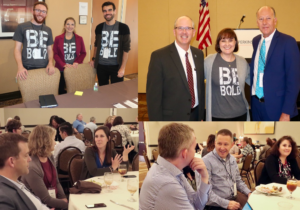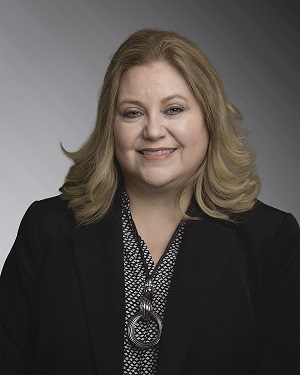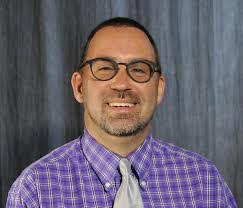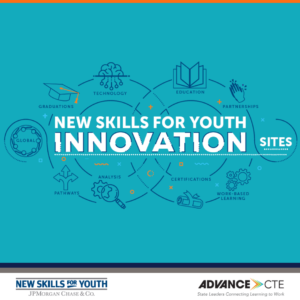Roger Barnes retired in June 2019 after over three decades of working to support students across Missouri. A week later, he took over as Missouri’s new State CTE Coordinator. When asked why he decided to transition to the new role, Roger explained that he knew he “wasn’t ready to stop serving students.”
Roger’s journey to his current position began similar to that of other CTE champions: as a CTE student. In high school, he was enrolled in his district’s local agricultural education program. After graduating, he went on to earn a four-year degree in agricultural mechanics but then decided to return home to work alongside his father on the family’s farm. During this time, Roger also began serving as a substitute teacher in the same agricultural program that had earlier supported his educational journey. Motivated to continue empowering more CTE students, Roger sought his teaching certification and worked his way up to becoming a high school principal. Later, he served as director of a local area career center and ultimately superintendent of a school district.
This experience at the district level allowed Roger to develop a deep insight into the effects of statewide systems and policies on students and teachers in the classroom. As a superintendent, he was invited to join Missouri’s CTE Advisory Council and collaborate with business leaders, policymakers and administrators across the state to inform the experiences of students in both rural and urban communities.
In his first year as State CTE Coordinator, Roger plans to continue collaborating with the statewide CTE Council to develop a high school CTE certificate for the class of 2021. The expectation is that the certificate will help students signal to businesses their level of career readiness following graduation from the secondary level. In addition, Roger intends to develop state programs that support opportunities for teachers to obtain work-based learning and professional training.
“To me, our real bright spots are what our CTSOs are doing in the state,” Roger noted.
Last year, Missouri saw 2 percent of its FFA students earn the American FFA degree — the highest degree an FFA member can receive — despite less than 0.5 percent of all FFA members nationwide earning this award.
Recognizing the state’s history of developing leaders through CTE, Roger looks to continue uplifting students across the state to become Missouri’s next generation of CTE champions.


 efforts to coordinate across systems and strengthen career readiness training. Delaware, for example, is building out its capacity to increase postsecondary attainment by scaling regional career pathways and work-based learning. Similarly, Rhode Island is leveraging its
efforts to coordinate across systems and strengthen career readiness training. Delaware, for example, is building out its capacity to increase postsecondary attainment by scaling regional career pathways and work-based learning. Similarly, Rhode Island is leveraging its  Building on interest from our members – and support from the Bill & Melinda Gates Foundation and Joyce Foundation – we decided to host another round of three Perkins V implementation meetings, joined once again by our excellent partners. Over the course of three months, we brought together about 300 leaders from across 44 states and Washington, DC, along with invited national CTE and workforce development experts from over 20 partner organizations, including National Skills Coalition, National Governors Association, ExcelinEd, Council of Chief State School Officers, New America, Education Strategy Group and others, to help states:
Building on interest from our members – and support from the Bill & Melinda Gates Foundation and Joyce Foundation – we decided to host another round of three Perkins V implementation meetings, joined once again by our excellent partners. Over the course of three months, we brought together about 300 leaders from across 44 states and Washington, DC, along with invited national CTE and workforce development experts from over 20 partner organizations, including National Skills Coalition, National Governors Association, ExcelinEd, Council of Chief State School Officers, New America, Education Strategy Group and others, to help states: At each meeting, states had the chance to present on their draft plans and strategies and get direct, actionable feedback from their peers and the invited partners. State leaders dug in deeply on issues including improving the quality of CTE programs/programs of study, closing equity gaps, leveraging the Comprehensive Local Needs Assessment to drive local innovation and learner-focused programming, aligning CTE and workforce development, and meaningful engagement of key stakeholders, such as Tribal communities and employers.
At each meeting, states had the chance to present on their draft plans and strategies and get direct, actionable feedback from their peers and the invited partners. State leaders dug in deeply on issues including improving the quality of CTE programs/programs of study, closing equity gaps, leveraging the Comprehensive Local Needs Assessment to drive local innovation and learner-focused programming, aligning CTE and workforce development, and meaningful engagement of key stakeholders, such as Tribal communities and employers.

 Eric sees his new role as an opportunity to update New Hampshire’s CTE system and make changes that will have lasting impacts. To accomplish this, Eric has been everything but a stranger to innovative ideas.
Eric sees his new role as an opportunity to update New Hampshire’s CTE system and make changes that will have lasting impacts. To accomplish this, Eric has been everything but a stranger to innovative ideas.
 The Partnership to Advance Youth Apprenticeship (PAYA), a multi-stakeholder initiative, just announced its nine grantees under the first joint philanthropic investment to expand youth apprenticeship in the United States. These grantees – selected from an extremely competitive pool of over 220 applicants from 49 states and Puerto Rico – will launch and expand high-quality youth apprenticeship programs in multiple cities, regions, and states, and in a range of industries. The grantee recipients are:
The Partnership to Advance Youth Apprenticeship (PAYA), a multi-stakeholder initiative, just announced its nine grantees under the first joint philanthropic investment to expand youth apprenticeship in the United States. These grantees – selected from an extremely competitive pool of over 220 applicants from 49 states and Puerto Rico – will launch and expand high-quality youth apprenticeship programs in multiple cities, regions, and states, and in a range of industries. The grantee recipients are: